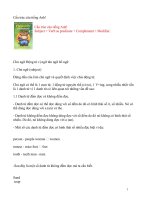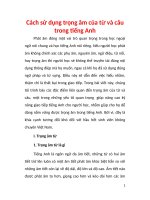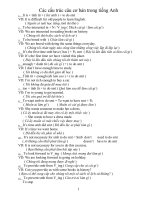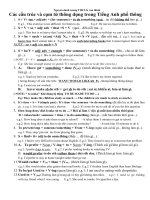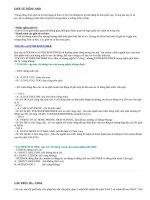Sentence transformation (Mẫu câu biến đổi câu trong Tiếng Anh- Rất hay)
Bạn đang xem bản rút gọn của tài liệu. Xem và tải ngay bản đầy đủ của tài liệu tại đây (79.52 KB, 2 trang )
transformation model prepared by NGUYEN HUU QUOC - 1 -
MODEL- TENSES
Model 1:
began
S + started + V-
ing
+ ago ⇔ S + have/ has + V
3
/ V-
ed
+ for
commenced
He began working in this factory five years ago → He has worked in this factory five years ago
They have lived there for two years. → They started living there two years ago
Model 2:
Began in
S + started + V-
ing
+ on (time) ⇔ S + have/ has + V
3
/ V-
ed
+ since
commenced at
They started playing games at 5 o’clock. → They have played games since 5 o’clock.
We began learning English in 2005. → We have learned (learnt) English since 2005.
Model 3:
S + no longer + V + ( O/C/A)
S + used to + V + (O/C/A) ⇔ S + V (not ) + (O/C/A) any more
S + often/ always V
2
/ V-
ed
+ ( O/C/A)
He used to sleep in class. → He no longer sleeps in class./ He doesn’t sleep in class any more.
He usually ate in class when he was young. → He used to eat in class when he was young.
Model 4:
S + have/ has not + V
3
/ V-
ed
+ since/ for → It is + time + since S +V
2
/V
ed
I haven’t seen my farther since last month. → It’s one month since I (last) saw my father.
Tom and Marie have been keypals for two years. → It is five years since Tom and Marie were
keypals.
Model 5:
S + have/ has (not) + V
3
/ V-
ed.
(before) → It’s the first time S + have/ has + V
3
/V-
ed.
(never)
Jason hasn’t met that man here before. → It’s the first time Jason has met that man here.
I have never read this book (before). → It’s the first time I have read this book.
Model 6:
S + have/ has not + V
3/ed +
since/ for → S + last V
2
/V
ed
WHEN S +V
2/ed
→ The last time + S +V
2/ed
+ was
I haven’t heard him since August. → The last time I heard him was in August.
I haven’t seen him since I was a student. → I last saw him when I was a student.
* Notes: Since 6 o’clock → at 6/ since August/ 2005 → in August/ in 2005
Since Monday → on Monday/ since last week → a week ago.
Since + S + V → when S + V
1
transformation model prepared by NGUYEN HUU QUOC - 2 -
Model 7:
S + have/ has ( not) + V
3/ed
for (time) → It is (time) since S ( last) + V
2
/V-
ed
I haven’t seen her for three weeks. → It’s three weeks since I last saw her.
Jason has learned Vietnamese for two years. → It’s two years since Jason began to learn
Vietnamese.
* We can add “ began or started” – instead of “ last” to verbs with progressive nature;
learn, study, work, lie, sit, stay, wait
Model 8:
Hardly/ Scarcely had + S
a
+ V
3/ed
when S
b
+ V
2
/V
ed
+
S
a
+ had hardly/ scarcely + V
3/ed
when S
b
+ V
2
/ V
ed
+
No sooner had + S1 + V
3/ed
than S
b
+ V
2
/ V
ed
+ .
S
a
+ had no sooner + V
3/ed
than S
b
+ V
2
/ V
ed
+
He had hardly seen me when he ran away. ↔ No sooner had he seen me than he ran away.
Scarcely had Jason sat down when the phone rang. ↔ Jason had no sooner sat down than the
phone rang.
Model 9:
be be
S + 〉 used to + V-
ing
/ N ⇔ S + 〉 accustomed to + V-
ing
/ N
get get
John is accustomed to swimming every day. ⇔ John is used to swimming every day.
Model 10:
S + V
2
+ not until S + V + / until + phrase
↑ ↓
It was not until S + V / phrase that S + V +
Emma didn’t begin to read until she was ten. → It was not until Emma was ten that she began to
read.
The carpenter didn’t finish his work until Monday. → It was not until Monday that the carpenter
finished his work.
Model 11:
S+ V + ( O/C/A) time ⇒ It will take/ takes/ took + (O) + time + to V
The flight to Paris lasts 12 hours. → It takes 12 hours to fly to Paris.
They spent two hours solving this problem. → It took them two hours to solve this problem.
Model 12:
After S + had +V
3/ed ,
S + V
2
/V-
ed
⇒ After V-ing , S + V
2
/V-
ed
After he had finished the book, he went to bed.⇒ After finishing the book, he went to bed.
(* S1 = S2)
2



